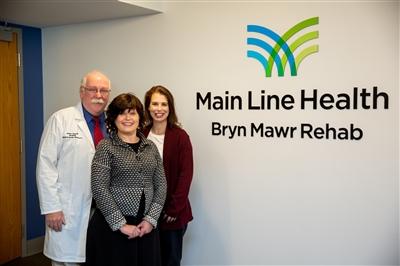Coordinated care helps ‘miracle’ patient achieve her goals
he last thing 55-year-old Yana Weiser-Shenkman recalls about the day of her accident is walking out of her synagogue. She doesn’t remember getting hit by a car or being rushed to Lankenau Medical Center’s trauma center. And she has no memory of the coma that followed. On that day two years ago, Weiser-Shenkman suffered a significant traumatic brain injury as well as pelvic, spinal, limb and facial fractures. Thankfully, she was less than three miles from trauma experts who were awaiting her arrival.
Comprehensive trauma care
“Lankenau Medical Center is a designated level II trauma center, having all the resources and expertise required to care for the most serious injuries 24 hours a day, 365 days a year,” explains Ehyal Shweiki, MD, director of the trauma center at Lankenau Medical Center, part of Main Line Health. “Our patient outcomes are in the top 10 percent of the country.”
Weiser-Shenkman was treated by a comprehensive team of specialists in trauma surgery, neurosurgery, neurological intensive care, orthopaedic surgery, oral maxillofacial surgery, ophthalmology and physical medicine and rehabilitation. Because of her brain injury, Weiser-Shenkman remained in a coma for 12 days. During that time, specialists monitored and controlled the abnormal swelling and pressure in her brain. When she slowly began to wake, she didn’t understand the extent of her injuries.
“I knew something had happened, but I thought I was fine. I had no idea how far I had to go,” recalls Weiser-Shenkman. “I’m glad I had my family at my side.”
Compassionate environment
Lankenau Medical Center understands the importance of helping patients and families through their physical, emotional and spiritual journey. Lankenau was able to make this difficult time a little easier for Weiser-Shenkman’s husband, mother and two daughters, who all stayed close to her in the onsite Shabbat Suite. The suite offers a comfortable and peaceful space for Jewish families to observe Shabbat and holidays. The suite features two private bedrooms, each with two beds and a private bathroom with shower, 24/7 private kitchen and stocked pantry, and a spacious lounge and private space for minyan.
“The Shabbat Suite gives Jewish family members a respite,” explains Dr. Shweiki. “They have one less thing to worry about and can focus on their loved one.”
Patient-centered rehabilitation
After two weeks at Lankenau Medical Center, Weiser-Shenkman was transferred to Bryn Mawr Rehab Hospital, part of Main Line Health, for intensive inpatient rehabilitation. In addition to her brain injury, she had orthopaedic trauma, which made her case more complicated. She received physical, occupational and speech language therapy to help overcome the physical and mental challenges caused by her accident.
“At Bryn Mawr Rehab, patients help set their own goals for therapy,” explains Natalie Sibley, PT, physical therapist. “It’s important for patients to choose goals that are meaningful for them and will improve their quality of life.”
Weiser-Shenkman’s primary goal? To participate in her daughter’s wedding. “The wedding was two months away, and I wanted to walk with my daughter down the aisle,” explains Weiser-Shenkman, who entered inpatient rehabilitation unable to stand. “I wanted to be a part of everything.”
Achieving her goals
Weiser-Shenkman worked with her physical therapist on improving her balance, endurance and, eventually, her walk. Her occupational therapist helped her relearn life skills using the wedding as motivation.
For example, Weiser-Shenkman practiced activities of daily living by trying on dresses for the event. In addition, using Bryn Mawr Rehab Hospital’s Reo-Go upper extremity robotic device helped to improve her range of motion, muscle strength, muscle tone, movement smoothness and accuracy of movements.

Weiser-Shenkman also worked with her speech-language pathologist to help recover small abilities she lost because of the accident, such as completing chores, making lists and staying organized.
“Many people aren’t aware that speech-language pathologists help patients with cognitive processing, attention, problem solving, memory and other issues,” explains Jolynn Thomas, MS, CCC-SLP, CBIS, speech-language pathologist at Bryn Mawr Rehab Hospital. “I helped Yana relearn cognitive skills that were weakened or lost by her brain injury and compensate for some of her deficits. With her hard work, she not only made progress in everyday life activities, but was able to be part of the planning process for her daughter’s wedding.”
Second chance at life
Today, two years after the accident and following 10 months of outpatient rehabilitation, Weiser-Shenkman has made incredible strides. She continues to complete therapy exercises at home and is looking forward to becoming a grandmother. But more than anything, she is happy to be alive and grateful for her care.
“I can’t say enough about my doctors, nurses and therapists. They were so compassionate, so amazing,” says Weiser Shenkman. “Everyone called me a miracle, but it hasn’t been easy. I continue to reframe who I am today and look forward to the future.”
Main Line Health serves patients at hospitals and health centers throughout the western suburbs of Philadelphia. To schedule an appointment with a specialist at Main Line Health, call 1.866.CALL.MLH (225.5654).